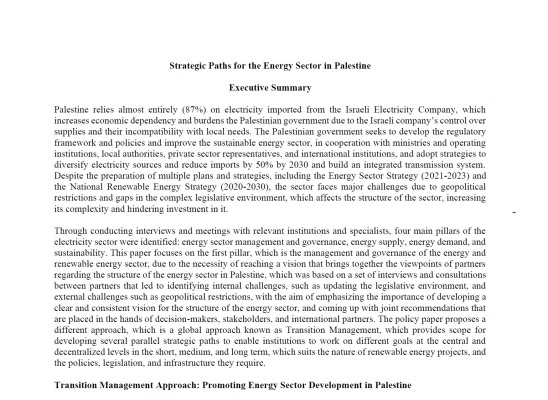Strategic Paths for the Energy Sector in Palestine (Excutive Summary)
Palestine relies almost entirely (87%) on electricity imported from the Israeli Electricity Company, which increases economic dependency and burdens the Palestinian government due to the Israeli company’s control over supplies and their incompatibility with local needs. The Palestinian government seeks to develop the regulatory framework and policies and improve the sustainable energy sector, in cooperation with ministries and operating institutions, local authorities, private sector representatives, and international institutions, and adopt strategies to diversify electricity sources and reduce imports by 50% by 2030 and build an integrated transmission system. Despite the preparation of multiple plans and strategies, including the Energy Sector Strategy (2021-2023) and the National Renewable Energy Strategy (2020-2030), the sector faces major challenges due to geopolitical restrictions and gaps in the complex legislative environment, which affects the structure of the sector, increasing its complexity and hindering investment in it.
Through conducting interviews and meetings with relevant institutions and specialists, four main pillars of the electricity sector were identified: energy sector management and governance, energy supply, energy demand, and sustainability. This paper focuses on the first pillar, which is the management and governance of the energy and renewable energy sector, due to the necessity of reaching a vision that brings together the viewpoints of partners regarding the structure of the energy sector in Palestine, which was based on a set of interviews and consultations between partners that led to identifying internal challenges, such as updating the legislative environment, and external challenges such as geopolitical restrictions, with the aim of emphasizing the importance of developing a clear and consistent vision for the structure of the energy sector, and coming up with joint recommendations that are placed in the hands of decision-makers, stakeholders, and international partners. The policy paper proposes a different approach, which is a global approach known as Transition Management, which provides scope for developing several parallel strategic paths to enable institutions to work on different goals at the central and decentralized levels in the short, medium, and long term, which suits the nature of renewable energy projects, and the policies, legislation, and infrastructure they require.

